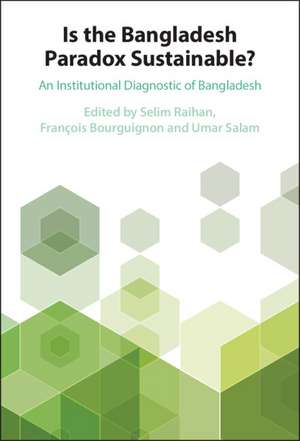Is the Bangladesh Paradox Sustainable?: The Institutional Diagnostic Project
Editat de Selim Raihan, François Bourguignon, Umar Salamen Limba Engleză Hardback – 29 sep 2023
Preț: 760.32 lei
Preț vechi: 884.09 lei
-14% Nou
Puncte Express: 1140
Preț estimativ în valută:
145.49€ • 155.58$ • 121.30£
145.49€ • 155.58$ • 121.30£
Carte tipărită la comandă
Livrare economică 17 aprilie-01 mai
Preluare comenzi: 021 569.72.76
Specificații
ISBN-13: 9781009284691
ISBN-10: 100928469X
Pagini: 400
Dimensiuni: 160 x 236 x 31 mm
Greutate: 0.76 kg
Editura: Cambridge University Press
Colecția Cambridge University Press
Locul publicării:New York, United States
ISBN-10: 100928469X
Pagini: 400
Dimensiuni: 160 x 236 x 31 mm
Greutate: 0.76 kg
Editura: Cambridge University Press
Colecția Cambridge University Press
Locul publicării:New York, United States
Cuprins
Part I. The Political, Economic, and Institutional Background of Bangladesh's Development: 1. An institutional diagnostic of Bangladesh: an introduction Selim Raihan and Francois Bourguignon; 2. Bangladesh's development: achievements and challenges Selim Raihan and Francois Bourguignon; 3. Critical institutional areas for Bangladesh's development Selim Raihan, Rafiqua Ferdousi and Towhid Iqram Mahmood; Part II. Six Challenging Institutional Areas: 4. Informal institutions, the rmg sector, and the present challenge of export diversification in Bangladesh Selim Raihan, with discussion by Jaime de Melo; 5. Political economy of private bank governance in Bangladesh Mirza Hassan, Sayema Haque Bidisha, Towhid Iqram Mahmood and Selim Raihan, with discussion by Thorsten Beck; 6. Institutional dimensions of tax reforms in Bangladesh Sadiq Ahmed, with discussion by Christopher Heady; 7. Institutional challenges in public spending: the case of primary education Selim Raihan, Zubayer Hossen, Bazlul Haque Khondker, with discussion by Elizabeth M. King; 8. Institutional challenges in land administration and management in Bangladesh Selim Raihan, Md. Jahid Ebn Jalal, Eshrat Sharmin and M. Abu Eusuf, with discussion by Dilip Mookherjee; 9. Political economy analysis of the role of the judiciary in land dispossession litigation in Bangladesh Rafiqua Ferdousi, Kazi Maruful Islam and Selim Raihan, with discussion by Jean-Philippe Platteau; Part III. An institutional Diagnostic of Bangladesh: 10. The Bangladesh institutional diagnostic: the synthesis Francois Bourguignon, Selim Raihan and Umar Salam.
Descriere
Diagnostic account of how institutions and politics have shaped the development of Bangladesh and reforms needed for further development.
